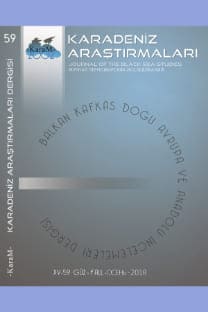The European Union's Black Sea Policy: In Light of Recent Developments
AB, sınırlarına uzak olan Karadeniz bölgesine yönelik yakın geçmişe kadar bölgesel bir politika geliştirmemiştir. 2007 yılında AB’ye üye olan Romanya ve Bulgaristan ile AB Karadeniz’e komşu olmuştur. Şüphesiz Birliğe yeni imkanlar kazandıracak bu genişleme aynı zamanda yeni tehdit, güvenlik kaygıları ve sorunları da beraberinde getirmiştir. Dolayısıyla bu durum AB’yi Karadeniz’e yönelik daha sistemli bir politika üretmeye zorlamıştır. Bu çalışmanın ilk bölümünde bölgenin AB açısından stratejik, ekonomik ve güvenlik açılarından önemi üzerinde durulacak, ikinci bölümde bölgenin önemine ve artık bölgeye komşu olmasına istinaden geliştirilen politikalar, projeler anlatılacaktır. Son bölümde ise Birliğin Karadeniz bölgesine yönelik politikalarının ne derece yeterli olduğu özellikle son gelişmeler doğrultusunda analiz edilmeye çalışılacak ve bölgede önemli bir aktör olmak konusunda AB’nin bundan sonrası için bölge devletlerine yönelik geliştirilmesi gereken politikalar konusunda öneriler sunulacaktır.
Anahtar Kelimeler:
Avrupa Birliği, Karadeniz, Komşuluk Politikası, Enerji.
The European Union's Black Sea Policy: In Light of Recent Developments
Until recently, the European Union failed to develop a regional policy toward the Black Sea due to the region's geographic distance from its borders. The accession of Romania and Bulgaria in 2007, however, expanded the Union to the Black Sea coast. Surely enough, European enlargement entailed not only new opportunities but also new threats, security concerns and problems. As such, the situation at hand compelled the EU to formulate a more systematic policy toward the Black Sea. The initial section of this study concentrates on the region's importance for the Union from a strategic, economic and security standpoint while the following part describes new policies and projects that the Union developed by merit of its neighborhood with this important region. The final section questions how effective the EU's policies toward the Black Sea have been with reference to recent developments in the region and recommends policies to increase the Union's influence over the region.
Keywords:
European Union, Black Sea, Neighborhood Policy, energy.,
___
- Agenda 2000- For a stronger and wider Union. Document drawn up on the basis of COM (97) 2000 final, 13 July 1997. Bulletin of the European Union, Supplement 5/97.
- AYDIN Mustafa (2004), “Europe’s next shore: The Black Sea region after EU enlargement”, Occassional Paper no.53.
- BELKIN Paul (2011), “The European Union’s Energy Security Challenges”, CRS Report.
- BP Statistic, “ A Review of World Energy”, June 2011.
- Commission of the European Communities, 11 April 2007, Black Sea Synergy – A New Regional Cooperation Initiative, http://ec.europa.eu/ world/enp/pdf/com07_160_en.pdf (12 April 2007)
- Commission of the European Communities, “Green Papaer: A European Strategy for Sustainable, Competitive and Secure Energy”, http:// www.europa.eu/legislation_summaries/energy/european_energy_poli cy/12706_en.htm (Retrieved: 12 December 2013)
- EGENHOWER C.- T. Legge (2009) “Security of Energy Supply:A Question for Policy or the Markets?”,Center for European Policy Studies Reports.
- EMERSON Michel (2008)“The EU’s New Black Sea Policy”, The Wider Black Sea Region in the 21st Century: Strategic, Economic and Energy Perspectives, (Ed.Daniel Hamilton and Gerhard Mangot),pp.252- 276.http://www.ceps.be/book/wider-black-sea-region-21st-century- strategic-economic-and-energy-perspectives (3 March 2014).
- EROL Mehmet Seyfettin (2012) “Türkiye’nin Orta Asya Politikasına Rusya Federasyonu ve Bölge Ülkelerinden Genel Bir Bakış”, Journal of Turkish World Studies, XII/1, pp.1-20.
- EROL Mehmet Seyfettin & Mehmet Şahin (2013) “Bağımsızlıklarının 20.yılında Orta Asya ve Kafkasyadaki Türk Cumhuriyetlerinin Entegrasyon Süreci (1991-2011)”, Karadeniz Araştırmaları, No.37, pp.111-136.
- EROL Mehmet Seyfettin- Oktay Bingöl (2012) “Afganistan’da Geçiş Safhası ve 2014 Sonrası Öngörüler”, Gazi Akademik Bakış, Vol.5, No.10, pp.173- 187.
- Energy 2020:A Strategy for Competitie,Sustainable and Secure Energy”, http://www.ec.europa.eu/energy/strategies/2020_en.htm (Retrieved: 24 May 2012)
- European Commission (2000), Annex 1, “Technical Background Document- Security of Energy Supply”, (Summary), Green Paper, COM(2010) (769).(Retrieved: 3 March 2012)
- European Neighbourhood Policy Strategy Paper, COM (2004), 373 Final, Brussels, 12.5.2004, (http://ec.europa.eu/world/enp/pdf/strategy/ strategy_paper_en.pdf
- European Commission, “European Security Strategy: A Secure Europe in a Better World”,European Commission, Brussels, 12 December 2003.
- European Commission, Wider Europe-Neighbourhood: A New Framework for Relations with Eastern and Southern Neighbours”, COM(2003) 104 final, (Retrieved: 11 March 2012)
- European Commission, “European Security Strategy: A Secure Europe in a Better World”,European Commission, Brussels, 12 December 2003
- FISCHER Sabine (2009), “The European Union and security in the Black Sea region after the Georgia Crisis”, Southeast European and Black Sea Studies, Vol.9, No.3, September, pp.332-349.
- GERMAN Tracey (2004), “Visibly Invisible: EU Engagemant in Conflict Resolution in the South Caucasus, European Security, Vol. 16, No. 3-4, pp.32-48.
- INOGATE Newsletter, No:3, Brussels, February 1999, p.1-2.
- LYNCH Dov (2003), “The EU: Towards a Strategy”, The South Caucasus; A Challenge for the EU, Paris, Institute for Security Studies European Union, pp.14-32.
- MENON Roger (2013), Russia’s Ukraine Power Play Pays Off, http:// nationalinterest.org/commentary/russias-ukraine-power-play-pays- 9461.
- PRODI R. (2002), “A Wider Europe-A Proximity Policy as the Key to Stability”, Speech to the Sixth ESCA-World Conference, Brussels.
- ROSSI R. (2004), “The European Neihbourhood Policy in Perspective”, Fulvio Attina(der.), European Neighbourhood Policy:Political,Economic and Social Issues, Cantania.
- SMITH K. (2005), “The Outsiders:The European Neighbouhood Policy”, International Affairs, Vol.81,No.4, pp.763-765.
- United States Energy Information Administration, “Caspian Sea region”, December 1998, http://www.eia.doe.gov/emeu/cabs/caspian.html. April 1, 1999. See also, http://www.traceca.org, (12.11.2012)
- WINROW Gareth (2008), Energy Security and the Caucasus, in Cengiz Çağla (Ed.) The Caucasian Challenge: Interests, Conflicts, Identities , İstanbul, OBIV.
- YILMAZ Sare Aydın (2013), “AB’nin Güvenlik Politikası ve Karadeniz Bölgesi ile İlişkileri”, [The EU’s Security Policies and Relations with the Black Sea Region] Karadeniz Araştırmaları, Sayı 39, s:1-14.
- ISSN: 2536-5126
- Yayın Aralığı: Yılda 4 Sayı
- Başlangıç: 2004
- Yayıncı: Osman Karatay
Sayıdaki Diğer Makaleler
AVRUPA BİRLİĞİ'NİN UKRAYNA POLİTİKASI: ESKİ KOMŞU MU? YENİ ADAY MI?
DEYİM VE ATASÖZLERİNİN ÖĞRETİLMESİNDE GÖRSEL BİR ARAÇ OLARAK KARİKATÜRLERİN BAŞARIYA ETKİSİ
B VARIŞOĞLU, İ ŞEREF, M GEDİKİ, İ. YILMAZ
SON SADRAZAMLARDAN HÜSEYİN HİLMİ PAŞA'NIN HAYATI VE FAALİYETLERİ
XVII. YÜZYILIN ORTALARINA DOĞRU KELKİD KAZASI
İbrahim E. ÇAKIR, SELÇUK DEMİR
????????? ?????????????? ????????????? ??? ???????? ????????????????? ??????????? ?
VOLGOGRAD SALDIRILARI, SOÇİ OLİMPİYATLARI VE KAFKASYA
RUSYA'DA ESİR BİR ZÂBİT VEKİLİ VE ESARET GÜNLÜĞÜ: HAFIZ ŞABAN EFENDİ
TEMETTUAT DEFTERLERİNE GÖRE TANZİMAT DÖNEMİNDE BİR TRAKYA KASABASI: PINARHİSAR
UKRAYNA KRİZİNİN ULUSAL, BÖLGESEL-KÜRESEL BAĞLAMI VE GELECEK ÖNGÖRÜLERİ
